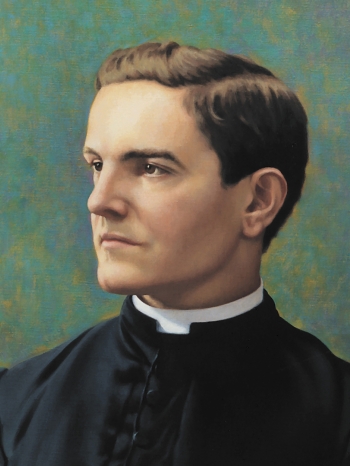
.jpg) F. M. Britto
F. M. Britto
.jpg)
His personal sufferings as an immigrant motivated him to relieve other migrants’ pains and wanted them to lead a better life. His belonging to a large family and had to earn as a youngster to support his family, gave him a compassionate heart.
Michael Joseph McGivney was born to Irish immigrant parents, Patrick and Mary McGivney on August 12, 1852 in Connecticut, US. His father worked as moulder in a local brass mill. But the 13 years old boy, who studied in a local district school, had to leave the school to work in a brass mill to support his family.
The 16 years old Michael entered the Seminary. But after his father’s untimely death, as the eldest son, the 21 years old Michael had to leave the seminary to help raise his seven younger siblings at home. Later he resumed his priestly studies and was ordained a Catholic priest on December 22, 1877.
Appointed as an assistant parish priest in the small town of New Haven, Father Michael noticed the sufferings of the immigrant families. Their poverty, lack of education and allegiance to the pope brought them discrimination.
Often the man of the family, the sole earner, died due to the nature of the immigrants’ hard manual labour. To provide financial assistance to their widows and her children, the 30 year old priest founded the Knights of Columbus (KC) on March 29, 1882, along with a small group of parishioners. As a man of the people, Fr. Michael took great efforts to better their living condition. The four principles of the KC became charity, unity, fraternity and patriotism.
The organization gradually brought hope in the suffering, acceptance amidst rejection and unity amidst division. The small group that grew up in his parish, gradually spread to whole US and soon to countries such as Canada, Philippines, Poland, Cuba, Ukraine, South Korea etc. It grew as one of the world’s largest Catholic fraternal organizations.
KC became one of the first groups to recruit blood donors during the 1937 Great Depression. Besides supplying a wide range of insurance benefits, the organization has been also active in war-relief, educational, religious, and social-welfare programmes.
In 2020 KC had reached to two million members, with 15,100 councils, donating $187 million and 77 million man-hours to charity. Though originally it was intended to serve the widows and orphans, now it cares people at all stages of life.
In the seven years he served as the assistant parish priest at New Haven, Fr Michael was known for his tireless work among his parishioners. The 32 year old priest was then transferred as parish priest to St Thomas Church in Thomaston in 1884.
Due to the 1889-90 pandemic, Fr Michael contracted pneumonia and the 38 years young priest died there on August 14, 1890. But his legacy continues.
Pope Francis proclaimed him a Blessed on May 27, 2020. Bishop Frank Caggiano of Connecticut then remarked, “Fr. Michael McGivney is an example to today’s priests. He inspires us to get out there and meet the poor where they live, be among them.”